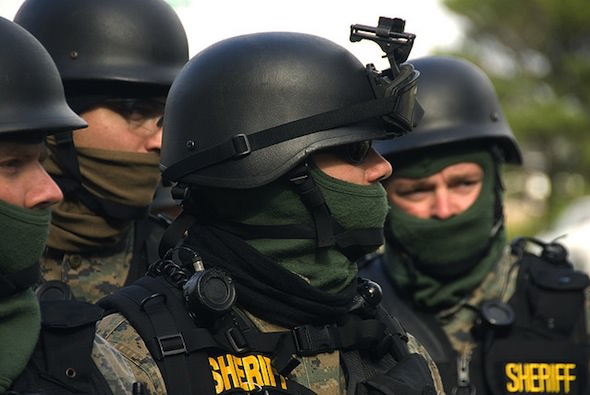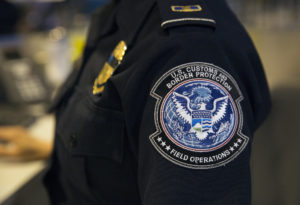Massachusetts SWAT Teams Claim They’re Private Corporations
Requests by the American Civil Liberties Union for open records on Massachusetts SWAT teams begat refusals to comply based on the premise that the forces are not government entities.
Requests by the American Civil Liberties Union for open records on Massachusetts SWAT teams begat refusals to comply based on the premise that the forces are private corporations rather than government entities.
At The Washington Post, Radley Balko explains that a number of SWAT teams in the state are operated by “law enforcement councils.” These councils are funded by police agencies in a particular region and overseen by an executive board made up primarly of police chiefs from member departments. Some of the councils have incorporated as 501(c)(3) organizations, meaning they claim the legal status of private corporations, including immunity from open records requests.
Balko comments:
Let’s be clear. These agencies oversee police activities. They employ cops who carry guns, wear badges, collect paychecks provided by taxpayers and have the power to detain, arrest, injure and kill. They operate SWAT teams, which conduct raids on private residences. And yet they say that because they’ve incorporated, they’re immune to Massachusetts open records laws. The state’s residents aren’t permitted to know how often the SWAT teams are used, what they’re used for, what sort of training they get or who they’re primarily used against.
Balko cites the ACLU of Massachusetts’ report on police militarization in the state:
Approximately 240 of the 351 police departments in Massachusetts belong to an LEC. While set up as “corporations,” LECs are funded by local and federal taxpayer money, are composed exclusively of public police officers and sheriffs, and carry out traditional law enforcement functions through specialized units such as SWAT teams . . .
Due to the weakness of Massachusetts public records law and the culture of secrecy that has infected local police departments and Law Enforcement Councils, procuring empirical records from police departments and regional SWAT teams in Massachusetts about police militarization was universally difficult and, in most instances, impossible . . .
Police departments and regional SWAT teams are public institutions, working with public money, meant to protect and serve the public’s interest. If these institutions do not maintain and make public comprehensive and comprehensible documents pertaining to their operations and tactics, the people cannot judge whether officials are acting appropriately or make needed policy changes when problems arise . . .
Hiding behind the argument that they are private corporations not subject to the public records laws, the LECs have refused to provide documents regarding their SWAT team policies and procedures. They have also failed to disclose anything about their operations, including how many raids they have executed or for what purpose . . .
METROLEC, one of the largest of the law enforcement councils covering the metropolitan Boston area, operates a range of specialized resources, including a Canine Unit, Computer Crimes Unit, Crisis Negotiation Team, Mobile Operations Motorcycle Unit, and Regional Response Team, in addition to its SWAT force. The organization maintains its own BearCat armored vehicle, as well as a $700,000 state of the art command and control post. In 2012, METROLEC reportedly used its BearCat 26 times, mostly for drug busts, and applied to the Federal Aviation Administration to obtain a drone license.
The North Eastern Massachusetts Law Enforcement Council (NEMLEC) similarly operates a SWAT team, as well as a Computer Crime Unit, Motorcycle Unit, School Threat Assessment & Response System, and Regional Communications and Incident Management Assistance Team. Its SWAT team members are trained and equipped to “deal with active shooters, armed barricaded subjects, hostage takers and terrorists,” and they dress in military-style gear with the words “NEMLEC SWAT” emblazoned on their uniforms. Given this training, it is not surprising that the NEMLEC SWAT team has over the past decade led numerous operations that involved armored vehicles, flash-bang devices, and automatic weapons.
Balko continues with comments from an ACLU lawyer:
“You can’t have it both ways,” Jessie Rossman, a staff attorney for the Massachusetts ACLU, told me in a phone interview. “The same government authority that allows them to carry weapons, make arrests, and break down the doors of Massachusetts residents during dangerous raids also makes them a government agency that is subject to the open records law.”
In some states, police agencies can claim exemptions from open records legislation for certain types of requests, such as for internal personnel files, or investigation documents that could reveal the identities of witnesses or informants. In some parts of the country, like the Virginia suburbs of Washington, police agencies have broadly interpreted open records laws to allow them to turn down just about every request. But this claim in Massachusetts is on a whole different scale.
“They didn’t even attempt to claim an exception,” Rossman says. “They’re simply asserting that they’re private corporations.”
The ACLU is now suing the North Eastern Massachusetts Law Enforcement Council.
Read more here.
— Posted by Alexander Reed Kelly.
Your support matters…Independent journalism is under threat and overshadowed by heavily funded mainstream media.
You can help level the playing field. Become a member.
Your tax-deductible contribution keeps us digging beneath the headlines to give you thought-provoking, investigative reporting and analysis that unearths what's really happening- without compromise.
Give today to support our courageous, independent journalists.






You need to be a supporter to comment.
There are currently no responses to this article.
Be the first to respond.